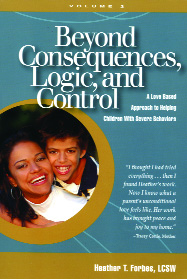Beyond Consequences Institute, LLC; 2008
Buy Beyond Consequences, Logic, and Control Volume 2 on Amazon.com >
My nine-year-old daughter is in a rage: defying, taunting, yelling. Nothing unusual at my house. Tonight it began when I told her to put on pajamas. My first impulse in these situations is to send her to time-out or to take away a privilege (“no TV tomorrow”). Instead, I stop myself and say, “It is beautiful outside and you were having fun riding your bike. It must be hard to let the evening go.” That seems to get a response, because, this time, she puts on her pajamas and gives me a goodnight kiss. Such a resolution is unusual at my house, but it is typical of my experience with the approach offered by Heather T. Forbes, in Beyond Consequences, Logic, and Control, Volume 2 .
The first of the book’s themes is to understand that children who have experienced trauma are hypersensitive to stress, and to know that their behavior will be driven by this stress. During a meltdown, focus on staying open to your child and his feelings, not on controlling his behavior.
Limiting the number of stresses—scaling back on after-school activities, say—in your child’s world is important, too. According to Forbes, when you give your child the time she needs to settle down, in a safe, nurturing environment, she will learn to trust you, and, over time, develop the capacity to handle stressful situations without acting out.
Another key theme of the book challenges parents to stay calm during battles. Threatening discipline, losing patience, reacting to others’ opinions of your parenting: Overcoming these impulses will help you make lasting changes at home and develop better relationships with your children, says Forbes.
It’s a tall order. I’ve been tempted already to drift away from Forbes’s approach—I suppose letting our child “get away with” nastiness does not reflect the way we were brought up ourselves. However, I believe that the author is on to something, about our family at least.
Reviewed by Kaitha Tice, mom to two children adopted through foster care.



